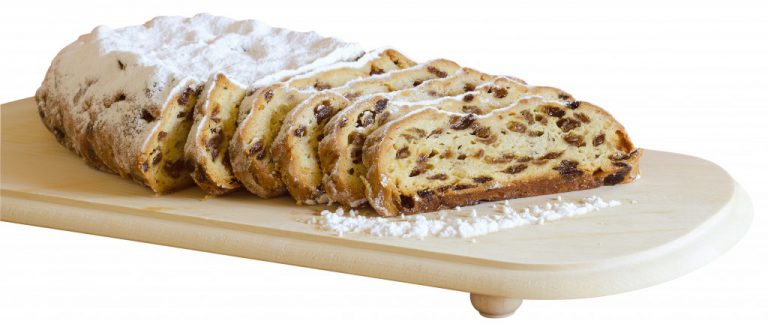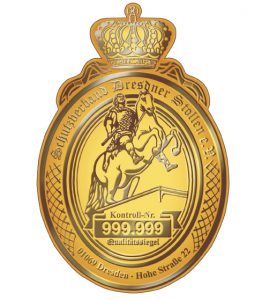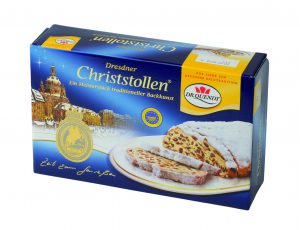Since Lidl and Aldi started offering their industrial versions of the German Stollen, Irish people became familiar with this seasonal speciality.
Stollen is a very special Christmas treat for me because my father used to bake it in November and the tightly wrapped loaves would occupy the tops of kitchen shelves and bedroom wardrobes to mature. The quality would vary from year to year as would my father’s mood when cutting the loaves. Stollen time usually started on the first Advent leading to Christmas and lasted as long as it was available (still good to eat at Easter).

What is a “Stollen”?
It is a traditional German fruit loaf which is often baked especially for the Christmas period.
This tradition went back as far as the 14th century and originated in the South-East of Germany.
There are many Stollen-varieties, for example, the almond, marzipan, nuts, poppy seed, butter or quark version.
Undoubtedly the tastiest (in my biased opinion) and the next best thing to my father’s effort is the original Dresdner Christmas Stollen (“Christstollen” = loaf reminds one of the wrapped body of baby Jesus).
The beautifully rebuilt and restored city of Dresden has a long and proud tradition of baking. Since 2008 “Dresdner Stollen” is a Protected Geographical Indication which means it is a brand that can only be produced by certified bakers in and around Dresden. Today there are about 120 certified bakeries – look out for their seal of approval (see picture to the right).
The rules for the bakers are strict: do not be stingy with butter and raisins.
For every kilogram wheat flour, the rules demand the use of 500g butter and 650g raisins/sultanas. Now add candied lemon peel, orange peel, almonds (sweet and bitter), milk, yeast, rum and some spices (cardamom, cinnamon) and ready is your Stollen. No artificial flavours and, above all, no baking forms. Stollen was and is a handcrafted product.
Another essential ingredient is time. A proper Stollen needs at least two weeks to mature and to marry all flavours. Then, rolled in a thick coat of powdered sugar, the loaf is ready to be packaged, shipped, sold, handed over, presented, sliced, dunked and enjoyed.
Stollen & Tea
There is nothing better around Christmas than staring into the fire with a slice of Stollen and a proper cup of tea. It is a piece of luxury, a small, sneaky indulgence in the hectic pre-Christmas rush. Stollen embraces life on the wrong side of dietary caution.
A perfect match for every slice is Tea. Its gentle assertiveness is an ideal accompanist for the rich, fruity-sweet and slightly spicy taste of the Stollen.
We would recommend our Christmas teas, uniting the seasonal flavours of cake and drink.
Black teas, in general, are a good pairing. Their strength and the presence of tannins cut through the buttery richness of the cake. If it is the green tea you prefer, we suggest the slightly more robust Mao Feng, Sencha or Gunpowder, the flowery Jasmine Superior or the spicy Kashmiri.
In the end, it does not matter which tea you prefer as long as you enjoy the occasion and find happiness in the small things in life – like Stollen and Tea.

Every year in November we order our Stollen directly from a bakery in Dresden. We are happy to be able to offer some original handcrafted Stollen to our customers.
We hope you will enjoy it as much as we do.